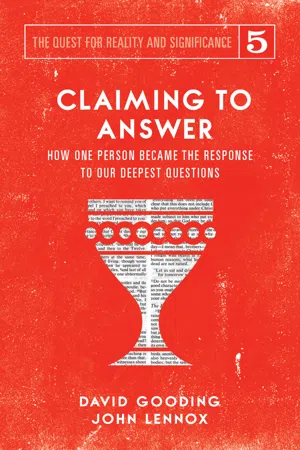
eBook - ePub
Claiming to Answer
How One Person Became the Response to Our Deepest Questions
This is a test
- English
- ePUB (mobile friendly)
- Available on iOS & Android
eBook - ePub
Claiming to Answer
How One Person Became the Response to Our Deepest Questions
Book details
Book preview
Table of contents
Citations
About This Book
In Book 5 – Claiming to Answer, Gooding and Lennox argue it is not enough to have an ethical theory telling us what standards we ought to live by, because we often fail in our duties and do what we know is wrong. How can we overcome this universal weakness? Many religions claim to be able to help, but is the hope they offer true? Gooding and Lennox state why they think the claims of Jesus Christ are valid and the help he offers is real.
Frequently asked questions
At the moment all of our mobile-responsive ePub books are available to download via the app. Most of our PDFs are also available to download and we're working on making the final remaining ones downloadable now. Learn more here.
Both plans give you full access to the library and all of Perlego’s features. The only differences are the price and subscription period: With the annual plan you’ll save around 30% compared to 12 months on the monthly plan.
We are an online textbook subscription service, where you can get access to an entire online library for less than the price of a single book per month. With over 1 million books across 1000+ topics, we’ve got you covered! Learn more here.
Look out for the read-aloud symbol on your next book to see if you can listen to it. The read-aloud tool reads text aloud for you, highlighting the text as it is being read. You can pause it, speed it up and slow it down. Learn more here.
Yes, you can access Claiming to Answer by David W. Gooding, John C. Lennox in PDF and/or ePUB format, as well as other popular books in Philosophy & Ethics & Moral Philosophy. We have over one million books available in our catalogue for you to explore.
Information
Topic
PhilosophySubtopic
Ethics & Moral PhilosophyChapter 1Do All Religions Lead to the Same Goal?
Without its distinctive doctrines and beliefs a religion would cease to exist as a religion. Moreover, people must be free honestly to publicise what they sincerely believe to be true, provided always they do it by peaceful means; and both truth and logic demand that they should be free to assert that what contradicts the truth is not true.

Introduction
More or less religion?
When anyone appears to claim that religion is the remedy for the human race’s faults and failings, and the cure for the moral confusion, cynicism and nihilism from which the world suffers, the claim, to many people, must seem, to say the least, problematical, if not altogether incredible. Look at the history of religions, they say. Religion has been the cause of endless wars, misery and bloodshed. And is it not the clash of world religions that at this present moment is fomenting international strife and terrorism? The fact is that Christendom in the Crusades raised its armies and slaughtered Muslims, Turks and Jews in disputes over sacred lands and sites. Catholicism in the auto-da-fés of Spain tortured and burned both Jews and Protestants; and Protestants in their turn in other countries fought Catholic armies and executed Catholic ‘heretics’. Hindus and Muslims still fight each other over the possession of holy sites. And does not the dispute over possession of the Temple Mount in Jerusalem still threaten world peace? To all of which we could add that in the twentieth century secular ideologies of both the East and West were pursued and enforced with all the absolutism of virtual religious and messianic zeal—with the result that large economies were ruined and multimillions died. Surely, say many, we need less religion, not more.
Others are not so sure. They have experienced the barren inability of atheism, naturalism and secularism to provide either a firm basis, or an adequate motivation, for private and public morality. Instinctively they feel that religion, with its spiritual dimension, could provide that basis, and stimulate sufficiently strong faith, hope and courage, to achieve private and public unselfishness, altruism, and morality necessary for the cohesion of both family and society. At least religion could do this, they feel, if (but it’s a very big if) all religions could be persuaded to stop fighting each other, and work together for the common good.
So far so good; and in the light of Christ’s prohibition on the use of force either to defend or to promote his kingdom and truth (see John 18:36–37), all Christians will blush with shame at the thought of people in the name of Christ waging war on other religions and trying to impose the Christian gospel by force of any kind.1
A common argument for mutual tolerance
But now there enters another argument, and it goes like this:
- It has been the stressing of differences between the various religions that has been, and still is, responsible for stirring up animosity and hatred between people of different faiths.
- Such stressing of the differences between religions is foolish, since all religions are essentially aiming at the same goal. They may be following different paths; but they are paths up the same mountain, and they are all aiming at, and will eventually arrive at, the same summit.
- The duty of all religions and religious people, therefore, is to agree to, and to preach, the fact that they all lead to the same God, that all aim at the same goal, and that their differences are minimally important. Thus all can, and should, work together for the common good.
This triple argument is undoubtedly attractive; but its cogency depends on the truth or otherwise of the three assumptions it makes:
- that the chief goal at which all religions aim is to get people to behave well towards one another;
- that all religions would agree that this is their chief goal; and
- that all religions would accept that their distinctive doctrines and beliefs are minimally important.
Assumption 1 gains plausibility because teaching people to observe a moral code is precisely what all mature religions set out to do; and all these moral codes have a good deal in common, e.g. kindness to little children and to the elderly, almsgiving to the poor, care for orphans and for the sick, respect for one’s fellow human beings, honesty in commerce, truth-telling, unselfishness, good citizenship, etc.
Even so, one would have to remember that not all religions have been, or are, particularly concerned with morality. The ancient classical religions of Greece and Rome worshipped gods and goddesses who were represented in their myths as behaving far more immorally than the people who worshipped them. Serious ethical teaching in the ancient classical world was the province, not of religion, but of philosophy.
Similarly, ancestor or spirit worship, which is still widely practised even among scientifically and technologically advanced nations, is not solely (or even, perhaps, chiefly) concerned with showing loving respect to the memory of one’s departed relatives, but also in great part with cajoling their spirits by the appropriate rites to stay in the spirit world and not to cause trouble by returning and haunting the homes of their living descendants. Or again, in some places, sacrifices and offerings are made to the gods (as we have ourselves witnessed) in order to persuade them to grant success in the football lottery, or to bribe them to favour oneself and be against one’s business competitors.
But let’s leave this aside, and return to the observation that mature religions are seriously concerned with teaching and encouraging people to behave well towards one another. But what follows from that?
Assumption 2 supposes that all these mature religions would agree that their main purpose is to encourage people to treat each other well and to do their duty to society. But the assumption is not true. The religions themselves would not agree with it; and they have a right not to. Religion is not simply moral philosophy. Though true religion is concerned, as the Christian New Testament puts it, ‘to visit orphans and widows in their affliction’ (Jas 1:27), there’s more to religion than that. Religion’s prime concern is with God, or the gods, and with the human race’s right relations with him, or them. An atheist can be seriously and sincerely concerned to live and work for the good of his fellow-citizens; and most atheists, we presume, are. But an atheist’s attitude to God is seriously astray. Let’s use an analogy to illustrate the point.
In centuries gone by, the seas of the world were sailed by many pirate ships. In some of those ships the pirates doubtless behaved very well towards one another and had rigorous and well-kept rules to ensure that the booty they captured was fairly shared out. In that sense they may well have been satisfied with the standard of morality they had achieved. But that would have overlooked the fundamental fact that they were pirates in rebellion against the lawful government on land! If that government had caught them, their excellent moral behaviour towards one another would not have saved them from hanging.
Table of contents
- Illustrations
- Series Preface
- Analytical Outline
- Series Introduction
- 1. Do All Religions Lead to the Same Goal?
- 2. The Historicity of the New Testament
- 3. The Figure of Christ: Fiction, Myth, or Reality?
- 4. The Resurrection of Christ and the Question of Miracles
- 5. The Evidence for the Resurrection
- Appendix: The Scientific Endeavour
- Series Bibliography
- Study Questions for Teachers and Students
- Scripture Index
- General Index
- About the Authors
